“People are always looking for IP, people are always looking for good stories,” says Lee Eisenberg, a longtime TV producer, who is turning WeCrashed into a series at Apple TV+. The evidence of that is in the steady stream of podcasts becoming television shows. There’s basketball ref scandal Whistleblower, Australian crime series The Teacher’s Pet, crime drama Over My Dead Body, beloved paranormal series Welcome to Night Vale, investigative series To Live and Die In LA, sci-fi drama Girl In Space, school drama Nice White Parents, serial killer thriller Happy Face, and so many more. This article could be nothing but a long, long list of shows that have gone from podcast to TV. As Gore Vidal once noted, “Television is now so desperately hungry for material that they’re scraping the top of the barrel.”
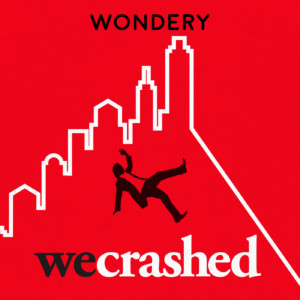
But how do podcasters who aren’t hooked up with Wondery or have an in at Apple TV+ get started bringing a podcast to a new medium? To find out the twists and turns of the podcast-to-TV pipeline, we spoke to Eisenberg, and three other experts: Wondery Chief Content Officer Marshall Lewy the; Homecoming creator Eli Horowitz, who helped shepherd it from Gimlet to Amazon; Aaron Mahnke, whose podcast Lore became a series on Amazon.
Podcast first
“We want to make the best podcasts possible that are as successful as possible as podcasts. And then, you know, bring it to television.”—Lewy
All the pros agreed that, first and foremost, you have to focus on making a great podcast. “If you’re trying to make a podcast that will be adapted to a TV show, you probably won’t make a very good podcast,” says Horowitz. “We had no intention of making a television show. We were really committed to the audio form.” While Horowitz admits that his piece of advice can be “mildly infuriating” to podcasters who want in on the TV action, even Wondery, which has seen a lot of success turning their podcasts into TV, first focuses their efforts on making great podcasts. “I think that there’s a misconception that we create our shows so that they will sell to TV, and that is really not the case,” says Lewy. “We want to make the best podcasts possible that are as successful as possible as podcasts. And then, you know, bring it to television.”
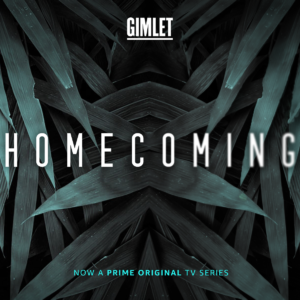
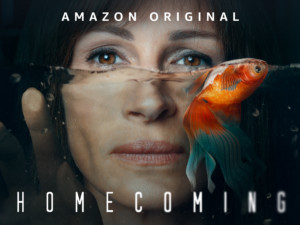
While Wondery has a proven television track record, for Lewy, it’s really the podcast that matters most. “If you make a good podcast, it’s going to rise up,” he says. “There’s so much appetite right now for big podcasts. People will come to you. I really believe that.”
Choose the right story
According to Lewy, the most important thing that a podcaster can do is “choose stories that are as unique as possible and develop them as a podcast in a way that has compelling characters.”
For Wondery, that means poring over the news and looking for just the right next big idea to turn into a show. “We look for stories that are just attention-grabbing, that are going to make you sit up and really pay attention and feel like ‘This is a story that I’ve never heard before that I can’t put down no matter what genre it is,’” he says.
Think of how you tell the story
“They’re looking for fresh ways of hearing the stories and I think what’s helpful with the podcast is it’s a very digestible medium.”—Eisenberg
Producers’ ears are piqued by stories that have potential, but they need to be able to hear that potential, which is where good storytelling comes in.
“They’re looking for fresh ways of hearing the stories and I think what’s helpful with the podcast is it’s a very digestible medium,” says Eisenberg, who knows a thing or two about what producers are looking for, since he wrote for and produced The Office and created Little America for Apple TV+. To make podcasts “digestible,” how you tell the story is critical. “Serial felt like the beginning of something—and they did not invent true crime,” says Eisenberg. “It was really, really well told, it was compelling, it felt like every week, people were binging, it was a story that had you on the edge of your seat. When you build anticipation—that’s such a hallmark of good storytelling.”
An immersive, compelling podcast makes it “easier for [producers] to imagine the translation into a film or TV show, because, you know, you’ve got scenes, you’ve got dialogue, you really get a strong sense of these characters from hearing their voices,” says Horowitz. “So it’s just like a smaller mental leap, which always helps.”
Podcasters should take advantage of the intimacy of the audio experience, too. “Really think about the format,” says Horowitz. “Be actively thinking about what is special about the audio format and what is challenging with the audio format, and really try to take those things seriously. Even if you secretly just want to make a TV show.”

Telling a story in audio means writing a script that really lays out the action, potentially using immersive sound design that transports listeners, and crafting a narrative that enthralls listeners and compels them to stay tuned. It’s an art form and a different one from crafting a visual story. “I can say that with 100 percent confidence, having made a podcast that was then turned into a TV show, they’re different animals,” says Mahnke.
“I think everybody who sits down to make a good show should be thinking about, ‘What is the journey I want to take my listeners on?’ And make sure that is super clear and that folks didn’t get lost along the way. Because if they didn’t get lost along the way, then your audience grows.”
Consider getting a platform partner
Building the infrastructure necessary to bring a podcast to television takes time, money, and connections. Eisenberg suggests podcasters consider partnering up with bigger platforms to learn the ropes and make the connections. “As you have success, you can start doing your own a little bit more,” says Eisenberg. “But, you know, you need marketing and you need publicity.”
Marketing and publicity matter

If you want your show to get in the ears of as many people as possible—including agents, actors, and TV development execs, you have to make sure they know your show exists. Frequently, that means devoting resources to marketing. “We want as wide an audience as possible, so we have an amazing marketing team,” says Wondery’s Marshall Lewy, who believes that some of the success of Dirty John was due to the fact that it was possibly the first podcast “that was released almost like a TV or movie.”
“We just pay a lot of attention to getting it out into the world and then hope that once people listen to it, they like it and love it, and share it, and that’s how it gets out there.” According to Lewy, Wondery currently has 17 projects in development and more going into production.
Publicity can also help build buzz around your podcast, luring in listeners. “To have our show break through the clutter, we do sometimes think about them as, as, you know, big releases that we want to get out into the world the same way you would with a new movie or a television show,” says Lewy. On a smaller scale, consider working with a publicist to help promote your show and connect to listeners and, perhaps, producers.
Build your network
If you want to get the attention of Hollywood, “build your network,” says Lewy. Hollywood is very much driven by connections and who you know and who you can get to listen to your show really matters. Take for example, the story of WeCrashed: “I have a relationship with some of the executives [at Wondery] so they just kind of tipped me off to the [WeCrashed] podcast before it aired, and thought that it would make a great limited series,“ says Eisenberg. “I listened to it and started reading up about the story and found it fascinating and got it set up at Apple.”
That trajectory is by design, honed from years of experience of Wondery taking shows from podcast to television. “We have a head of TV and film who is thinking about and talking really early with the team that makes the podcast,” explains Lewy. “As we’re making the content on the podcast, he’s reading the scripts early and listening to early versions and trying to get his head around what this might look like as a TV or film project.”
Think about casting
Attracting top-tier talent has gotten easier as Wondery has burnished its reputation for taking podcasts to TV. “I think we get the benefit of the doubt now,” says Lewy. “When a project of ours is going to come out, people are interested and they want to hear it.” In addition to getting A-listers like Will Ferrell to sign on to the television adaptation of The Shrink Next Door, they are also getting stars to voice their podcasts, too. “For Jacked, Taraji Henson was the host, and she’s also an executive producer of the TV series,” says Lewy. While it may not be as easy for small, start-up podcasters to attract such big-name talent, thinking about casting early can’t hurt—and shooting for the stars to voice podcasts can be a good way to attract the attention of the big networks.
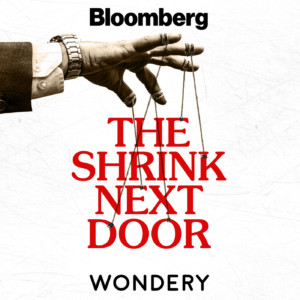
Be a little choosy
If you are lucky enough to have producers come calling, take your time finding the right team. If one producer calls, there may be other interested parties.
“I did a bunch of conference calls with different people who were interested or may be interested or said they were interested,” says Eli Horowitz of Homecoming. “The one that really stood out was with Sam Esmail, the creator of Mr. Robot.”
Mahnke had a similar experience. Lore had been getting a lot of attention from producers. Some had produced small-scale Yahoo! videos while others were movers and shakers at major cable networks. “The person that connected the most with me had been an executive producer on a number of History Channel shows, which, as a guy making a history show, just sort of connected well with me,” says Mahnke. They worked together to figure out what Lore the TV show would be and partnered with Valhalla, the folks behind The Walking Dead, to bring their vision to life. When it came to finding a network, they also took the time to choose the right fit. “At the end of the day, Amazon was the one that came in with the right path for us,” says Mahnke.
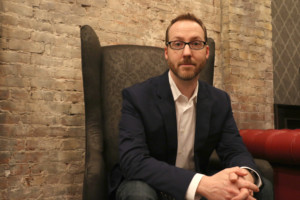
Be patient
“TVs a really slow process,” says Mahnke. “It took months and months and months.” For Lore, Mahnke first started talking with producers in August of 2015 and the show’s first episode came out on Amazon, on Friday the 13th in October 2017—and that’s relatively speedy for Hollywood. That entire time, Mahnke was still regularly releasing episodes of his podcast, because that was definitely still his day job. TV is fickle and even when a deal is signed, it may not come to fruition, so continuing to release your podcast is important.
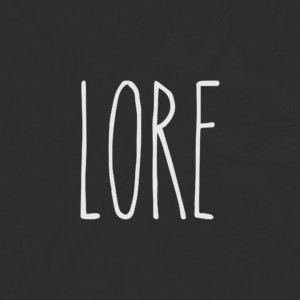
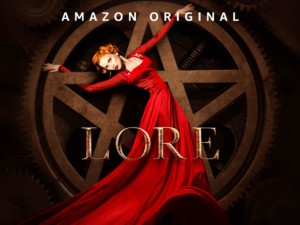
Remember that podcasts can be gateways
If you’re interested in learning more about the world of television, if your podcast does get picked up by a producer, try to stay involved. After writing Homecoming, Horowitz served as an executive producer for the Amazon series. Marshall Lewy is an EP on many of Wondery’s forays into television, including Dr. Death, Joe Exotic, and the forthcoming The Apology Line. As for Mahnke, he now has writer, producer, and actor credits and has a much deeper understanding of the TV-making process.
Consider an agent or an entertainment lawyer
“There’s a whole industry of people looking for properties to buy,” Horowitz points out, but finding those people can be tough for newcomers. That’s where agents come in. While the idea of getting an agent may conjure up images of Entourage’s Ari Gold or Tom Cruise in Jerry Maguire, making deals for sports or movie stars, they are increasingly common in podcasting.
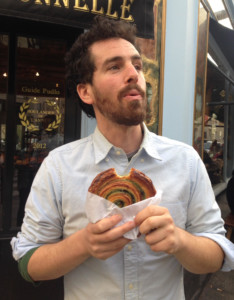
“The agencies have really increased their presence,” says Lewy. “And the studios that run television and film have really increased their presence in the podcast space considerably, so we are getting more pitches that come from agents and more podcasters have agents than was the case three years ago or even two years ago.”
Now, podcasts, along with books and other articles, are passed from agents to clients and production houses, meaning shows like Wondery’s The Shrink Next Door can have Will Ferrell attached when shopped to networks. “The hot ones get sold before they even come out,” says Horowitz. “I think people just want to buy things, which is silly, but helped us.” That said, Horowitz doesn’t think people need an agent until “you made something people care about.”
Mahnke says that one of his regrets from the early days of taking Lore to TV was not having someone to help guide him early on. “It being my first TV show, I didn’t know what I should be asking for, what I should be insisting my involvement be,” he says. “Looking back, that would be very different.” He recommends getting an entertainment lawyer from day one to help navigate deals and make sure the experience is a good one.
Getting an agent is not essential, of course, as Mahnke proved you can get a deal without one. It just may be a bit trickier to get your podcast in the ears of those in Hollywood, though that may be moot if your show is at the top of the charts. Agents do have a downside: Traditional agency agreements mean giving up 10% or more of any deal they make on your behalf. That said, most pros agree that it can make connections a lot easier.
You don’t have to work in television
While Hollywood can certainly be alluring, it’s not for everyone. As a podcast creator, you’re entitled to say no and stick to being the captain of your own ship, so to speak. Even those who have traversed the pipeline may want to stay right where they are. “I see the allure of the TV world and I will continue to work in that space,” says Mahnke. “I have a number of projects going and in various stages, and I want to continue making things there, but there’s something pure and beautifully simple in podcasting…I’m not walking away from podcasting.”




Comments